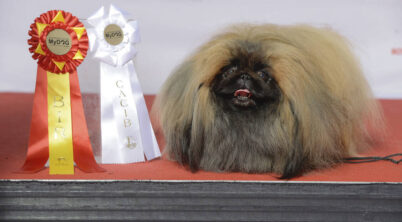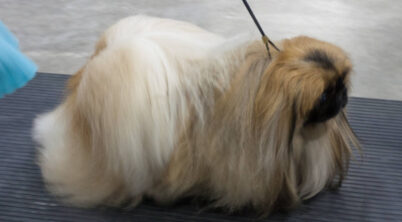Pekingese dogs are cherished for their elegant coats and distinctive appearance, but owners frequently face the challenge of managing their pets’ itchy skin. This condition can be attributed to a variety of causes ranging from allergies to skin infections. It’s crucial for owners to recognize the symptoms early, as incessant scratching can lead to more serious complications like skin sores or infections.
Allergies are a common culprit behind the itchiness in Pekingese breeds. They can be allergic to a number of substances, including pollen, certain foods, and even common household products. These allergies often manifest as skin irritations, prompting the dog to scratch incessantly. Understanding and identifying these environmental or dietary triggers is the first step toward providing relief to a suffering pet.
Beyond allergies, other factors such as parasitic infestations, fungal or bacterial infections, and poor diet may also contribute to skin discomfort. Treatments typically involve a combination of lifestyle adjustments, specialized diets, and medical interventions, depending on the underlying cause. For long-term management, reinforcing the dog’s immune system with supplements, like fish oil and probiotics, can be beneficial in supporting skin health.
Table of Contents
Understanding Canine Skin Health
In the context of Pekingese dogs, maintaining skin health is crucial, as this breed is susceptible to skin issues. Adequate nutrition and an understanding of common skin conditions can prevent and alleviate discomfort.
Role of Nutrition in Skin Condition
Proper nutrition plays a vital role in maintaining the skin health of Pekingese dogs. A balanced diet rich in essential nutrients is necessary to support their skin’s integrity and function. Proteins are the building blocks of skin cells, while omega-3 and omega-6 fatty acids, found in foods like salmon, contribute to a healthy skin and coat by reducing inflammatory responses.
- Key Nutrients for Skin Health:
- Proteins: Support cell repair and growth.
- Omega-3 fatty acids: Anti-inflammatory properties that manage skin flare-ups.
- Omega-6 fatty acids: Promote healthy skin and coat.
Ensuring a diet balanced in these nutrients can help manage and prevent skin conditions, leading to less itching and discomfort for the dog.
Common Skin Problems in Pekingese Dogs
Pekingese dogs can experience various skin problems, some of which may be tied to genetic factors. Awareness of these conditions can lead to better prevention and treatment strategies.
- Common Issues Include:
- Allergic Reactions: Manifest as itchy skin, excessive scratching, and sometimes hair loss.
- Genetic Health Problems: Such as alopecia, which may also result in hair loss and itchy skin.
Exposure to allergens can cause reactions in Pekingese dogs, making allergy management a key component of skin health care. Regular check-ups with a veterinarian allow for early detection and treatment of these conditions.
Allergies and Infections
In Pekingese dogs, allergies and infections are chief causes of itchy skin, often leading to discomfort and potential complications like ear infections. Allergic reactions may be to food, environmental factors, or flea bites, while infections can be bacterial, such as pyoderma, or fungal.
Identifying Allergies
Allergies in Pekingese manifest through itchy skin, hot spots, and ear infections. They arise from their immune system’s response to various allergens including:
- Foods (chicken, beef, dairy, wheat, corn)
- Environmental factors (pollen, dust mites)
- Flea allergy dermatitis
To pinpoint the allergens, veterinarians may recommend allergy testing. These tests can be either intradermal skin tests or serum allergic tests, and they help determine the specific cause of the allergic reaction.
Dealing with Infections
Infections causing itchy skin in Pekingese are typically bacterial (pyoderma) or fungal in origin. Bacteria on the skin can cause infection if the skin is damaged. Key signs of infections include:
- Redness and inflammation
- Pustules or crusty skin
Veterinary care is crucial for treating these infections, often requiring antibiotics or antifungal medications. Moreover, regular ear cleaning can prevent ear infections, a common issue in Pekingese due to their folded ear structure. Cleanliness and medications prescribed by a veterinarian are imperative to manage these infections effectively.
Itchy Skin Management
Managing itchy skin in Pekingeses requires a proactive approach to alleviate discomfort and prevent further skin damage. Employing both at-home care and professional veterinary insight ensures a comprehensive treatment plan.
Treating Symptoms at Home
- Regular Baths: Frequent bathing with medicated shampoos can provide relief from itching and help treat underlying skin problems. These shampoos are formulated to soothe the skin and reduce inflammation.
- Supplements: Introduce supplements like probiotics or quercetin to your dog’s diet, as these can bolster the immune system and potentially reduce allergy symptoms.
- Environmental Control: Minimize exposure to known allergens in the pet’s environment, such as pollen or dust mites, to reduce itching and scratching.
- Preventive Measures: Keep your Pekingese’s nails trimmed to prevent excessive damage from scratching, and use an Elizabethan collar to restrict biting and licking of hot spots.
When to See a Veterinarian
- Persistent Symptoms: If symptoms of itching, scratching, or biting persist despite at-home management, it’s crucial to consult a veterinarian.
- Medications: A vet can prescribe anti-inflammatory medications, antihistamines, or glucocorticoids to control severe itching and address underlying conditions.
- Diagnosis: A professional diagnosis is necessary to identify the exact cause of skin problems, which might include allergies, infections, or other skin diseases.
- Long-Term Treatments: For chronic cases, a veterinarian may recommend hyposensitization therapy, a long-term solution that involves gradually desensitizing the immune system to specific allergens.
Dermatological Health and Nutrition
Ensuring a Pekingese dog maintains a healthy coat and skin is deeply intertwined with its nutritional intake. A diet that lacks essential nutrients can lead to skin issues, including itching and allergic reactions.
Recommended Dietary Adjustments
A balanced diet is crucial for the Pekingese breed to maintain dermatological health. Diet adjustments should focus on:
- Kibble: Select high-quality kibble that is rich in omega-3 fatty acids to promote a healthy coat.
- Fresh Food: Incorporating fresh food into a Pekingese’s diet can provide natural sources of vital vitamins and can reduce exposure to potential dietary toxins.
- Control of Histamines: Foods low in histamines are preferable if the dog shows signs of allergic reactions.
Supplements to Support Skin Health
Supplements can bolster a Pekingese’s diet and alleviate skin problems:
- Omega-3 Supplements: These can reduce inflammation and are vital for skin and coat health.
- Probiotics: Probiotics support the immune system and can help prevent diarrhea, vomiting, and allergic responses.
Incorporating these dietary adjustments and supplements can support a Pekingese’s skin health, contributing to the prevention of common skin problems such as itching and allergic reactions.
Preventative Care and Regular Health Checks
Preventative measures and consistent health evaluations are instrumental in maintaining the well-being of a Pekingese, particularly for skin conditions that are prone to itching and irritation.
Routine Grooming and Skincare
Grooming is vital for a Pekingese’s skin health. Regular brushing facilitates the removal of dead hair and skin, helping to prevent mats that can trap moisture and parasites, which may lead to skin infections. At least biweekly brushing is recommended, with more frequent grooming during shedding seasons.
Bathing should be done with a mild, dog-appropriate shampoo to keep their skin clean and to remove allergens and irritants. Owners should consult a veterinarian to choose a suitable bathing schedule as overbathing can strip natural oils and exacerbate skin issues.
Importance of Veterinary Exams
Routine exams by a licensed veterinarian are crucial for early detection and treatment of health issues. Owners should ensure their Pekingese has at least one veterinary check-up annually, or more frequently for senior dogs or pets with known health concerns.
During these visits, the vet will assess the dog’s skin condition, recommend an appropriate exercise routine to maintain skin health, and may suggest pet insurance to offset the cost of any potential treatments. Monitoring and adjusting the Pekingese’s diet may also be advised, as nutrition significantly impacts skin condition.
* Banner by Corey Harris, cropped | Some rights reserved








